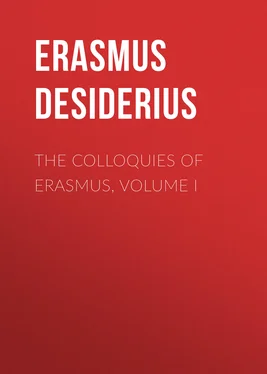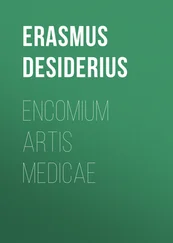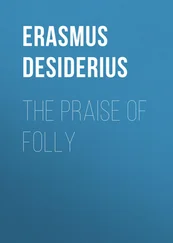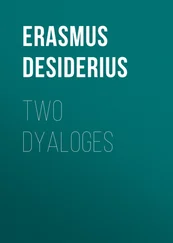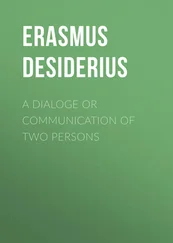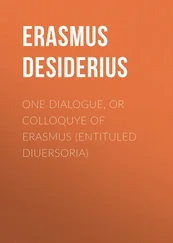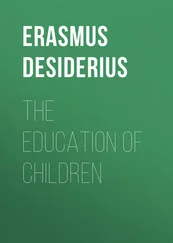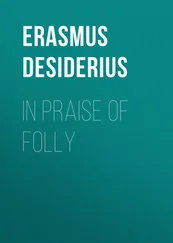Desiderius Erasmus - The Colloquies of Erasmus, Volume I
Здесь есть возможность читать онлайн «Desiderius Erasmus - The Colloquies of Erasmus, Volume I» — ознакомительный отрывок электронной книги совершенно бесплатно, а после прочтения отрывка купить полную версию. В некоторых случаях можно слушать аудио, скачать через торрент в формате fb2 и присутствует краткое содержание. Жанр: foreign_prose, foreign_antique, на английском языке. Описание произведения, (предисловие) а так же отзывы посетителей доступны на портале библиотеки ЛибКат.
- Название:The Colloquies of Erasmus, Volume I
- Автор:
- Жанр:
- Год:неизвестен
- ISBN:нет данных
- Рейтинг книги:5 / 5. Голосов: 1
-
Избранное:Добавить в избранное
- Отзывы:
-
Ваша оценка:
- 100
- 1
- 2
- 3
- 4
- 5
The Colloquies of Erasmus, Volume I: краткое содержание, описание и аннотация
Предлагаем к чтению аннотацию, описание, краткое содержание или предисловие (зависит от того, что написал сам автор книги «The Colloquies of Erasmus, Volume I»). Если вы не нашли необходимую информацию о книге — напишите в комментариях, мы постараемся отыскать её.
The Colloquies of Erasmus, Volume I — читать онлайн ознакомительный отрывок
Ниже представлен текст книги, разбитый по страницам. Система сохранения места последней прочитанной страницы, позволяет с удобством читать онлайн бесплатно книгу «The Colloquies of Erasmus, Volume I», без необходимости каждый раз заново искать на чём Вы остановились. Поставьте закладку, и сможете в любой момент перейти на страницу, на которой закончили чтение.
Интервал:
Закладка:
Further, no mention is there made of fasting , to which the Gospel and the Apostolic epistles exhort us, but concerning the choice of foods , which Christ openly sets at naught in the Gospel, and the Pauline epistles not seldom condemn; especially that which is Jewish and superstitious. Some one will say, this is to accuse the Roman Pontiff who teaches that which the Apostle condemns. What the Gospel teaches, is perfectly plain. The Pontiff himself must declare with what intention he commands what the Gospel does not require. Yet no one there says—what I know not whether Luther teaches—that the constitutions of the Pontiffs do not render us liable to guilt, unless there has been contempt besides. In fact, he who speaks in that passage grants that the Pope may appoint an observance; he simply enquires, whether this were the intention of the Pope, to bind all equally to abstinence from meats, so that one who should partake would be liable to hell-fire, even although no perverse contempt should be committed. And he who says this in the Colloquies, adds that he hates fishes not otherwise than he does a serpent. Now, there are some so affected that fish is poison to them, just as there are found those who in like manner shrink from wine. If one who is thus affected with regard to fishes, should be forbidden to feed on flesh and milk-food, will he not be hardly treated? Is it possible that any man can desire him to be exposed to the pains of hell, if for the necessity of his body he should live on flesh? If any constitution of Popes and Bishops involves liability to the punishment of hell, the condition of Christians is hard indeed. If some impose the liability, others not; no one will better declare his intention than the Pope himself. And it would conduce to the peace of consciences to have it declared. What if some Pope should decree that priests should go girt; would it be probable that he declared this with the intention that if one because of renal suffering should lay aside the girdle, he should be liable to hell? I think not. St. Gregory laid down, That if any one had had intercourse with his wife by night, he should abstain the next day from entering church: in this case, supposing that a man, concealing the fact of intercourse having taken place, should have gone to church for no other reason than that he might hear the preaching of the Gospel, would he be liable to hell? I do not think the holiest man could be so harsh. If a man with a sick wife should live on meat, because otherwise she could not be provoked to eat, and her health required food, surely the Pope would not on that account determine him to be liable to hell! This matter is simply made a subject of enquiry in the passage referred to, and no positive statement is made. And certainly before the Imperial Edict, men were at liberty to enquire concerning these matters.
In point of fact, neither in that place nor elsewhere do I absolutely condemn the Indulgences of the Popes, although hitherto more than sufficient indulgence has been shown them. It is simply that a speaker ridicules his comrade, who, although in other respects the most frivolous of triflers (for so he is depicted), yet believed that by the protection of a Bull he would get safely to heaven. So far from thinking this to be heretical, I should imagine there was no holier duty than to warn the people not to put their trust in Bulls, unless they study to change their life and correct their evil desires.
But Vows are ridiculed in that passage. Yes, they are ridiculed, and those (of whom there is a vast multitude) are admonished, who, leaving wife and children at home, under a vow made in their cups, run off along with a few pot-companions to Rome, Compostella, or Jerusalem. But, as manners now are, I think it a holier work to dissuade men altogether from such Vows than to urge to the making of them.
These, forsooth, are the execrable heresies which yonder Lynceus descries in the Puerile Colloquy. I wonder why he does not also give my Catunculus and the Publian mimes 4 4 Publius Syrus (B.C. 45), a writer of mimes , or familiar prose dramas. A collection of apophthegms from his works is said to have been used as a school-book in Jerome's days.
a dusting. Who does not perceive that these attacks proceed from some private grudge? Yet in nothing have I done him an injury, except that I have favoured good literature, which he hates more than sin; and knows not why. Meantime he boasts that he too has a weapon, by which he may take his revenge. If a man at a feast calls him Choroebus or a drunkard, he in his turn will in the pulpit cry heretic, or forger, or schismatic upon him. I believe, if the cook were to set burnt meat on the dinner-table, he would next day bawl out in the course of his sermon that she was suspected of heresy. Nor is he ashamed, nor does he retreat, though so often caught, by the very facts, in manifest falsehood.
In the first place what a foolish, what a mad blather he made against my revised New Testament! Next, what could be more like madness than that remark which he threw out against J. Faber and myself, when the very facts bespoke that he did not understand what agreement there was between me and Faber, or what was the subject of controversy! What more shameless than his fixing a charge of forgery and heresy in the course of a public address on me, because I rendered according to the Greek: Omnes quidem non resurgemus, sed omnes immutabimur ("We shall not all rise again, but we shall all be changed.") What more like a raging madman, then his warning the people at Mechlin, in a public address, to beware of the heresy of Luther and Erasmus! Why should I now recall the ravings that he belches out rather than utters in the midst of his high feasting as often as his zeal for the house of the Lord is inflamed from his cups? He lately said in Holland, that I was set down for a forger among the divines of Louvain. (One who was present and heard it wrote to me.) When asked, Why? Because, says he, he so often corrects the New Testament! What a dolt of a tongue! Jerome so often corrected the Psalter: is he therefore a forger? In short if he is a forger, who either rashly or from ignorance translates anything otherwise than it should be, he was a forger, whose translation we use at the present day in the Church. But what good does this sort of behavior do him? All men laugh at him as a Morychus, 5 5 Lit.: One stained or smeared: an epithet of Bacchus (Dionysos) in Sicily, "smeared with wine-lees." ([Greek: moryssô].)
shun him as a crackbrain,—get out of his way as a peevish fellow you can do nothing with. Nor can they think ill of him, of whom he says such spiteful things. And though he displeases all, himself alone he cannot displease.
This doubtless he holds to be an Imperial edict, that he with raging insolence of tongue should rave at whomsoever he pleases. Thus does this wise and weighty man support the interests of the orthodox faith. This is not a zeal of God, to hurt the harmless; but it is a rage of the devil. The Jewish zeal of Phinehas was once extolled, but not that it might pass as a pattern with Christians. And yet Phinehas openly slew impious persons. To your colleague whatever he hates is Lutheran and heretical. In the same way, I suppose, he will call small-beer, flat wine, and tasteless broth, Lutheran. And the Greek tongue, which is his unique aversion,—I suppose for this reason, that the Apostles dignified it with so great an honour as to write in no other,—will be called Lutheran. Poetic art, for he hates this too, being fonder of the potatic , will be Lutheran.
He complains that his authority is lessened by our means, and that he is made a laughing-stock in my writings. The fact is, he offers himself as an object of ridicule to all men of education and sense; and this without end. I repel slander . But if learned and good men think ill of a man who directs a slander at one who has not deserved it, which is it fair to consider the accountable person, he who rightly repels what he ought not to acknowledge, or he who injuriously sets it afoot? If a man were to be laughed at for saying that asses in Brabant have wings, would he not himself make the laughing-matter? He cries out that the whole of Luther is in my books , that on all sides they swarm with heretical errors. But when those who read my writings find nothing of the kind, even if ignorant of dialectics, they readily infer the true conclusion. He has authority from the Emperor. Let him therefore conduct himself in the spirit of the Emperor, who would rather that wrong-doers should be cured than punished, and certainly does not desire that the harmless should be injured. He has entrusted this function to a man he did not know; when he shall have ascertained the fellow's character, he will doubtless recall what he has entrusted. It is not the disposition of the mildest of Emperors, nor of the most upright of Popes, that those who spend their night-watches in studying how to adorn and assist the State, should be exposed to the spite of such men; even although there were some human infirmity in the case. So far are they from desiring to estrange good and honest men, and force them to take a different side.
Читать дальшеИнтервал:
Закладка:
Похожие книги на «The Colloquies of Erasmus, Volume I»
Представляем Вашему вниманию похожие книги на «The Colloquies of Erasmus, Volume I» списком для выбора. Мы отобрали схожую по названию и смыслу литературу в надежде предоставить читателям больше вариантов отыскать новые, интересные, ещё непрочитанные произведения.
Обсуждение, отзывы о книге «The Colloquies of Erasmus, Volume I» и просто собственные мнения читателей. Оставьте ваши комментарии, напишите, что Вы думаете о произведении, его смысле или главных героях. Укажите что конкретно понравилось, а что нет, и почему Вы так считаете.
